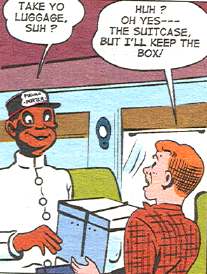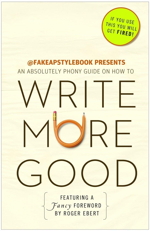More racial sensitivity in comic books, plus more ’90s stuff.
I don’t normally buy current publications from Archie Comics, and when I do, it’s almost always books that reprint their work from the ’60s and earlier. Such was the case with last week’s Archie Digest #236, which reprints Archie’s first appearance from Pep #22, along with a full reprinting of Archie #1 from 1942.
One of the stories from Archie #1 has Archie involved in a series of mix-ups on a train with another passenger, and the poor railroad porter gets caught in the shenanigans as well. The porter looks and talks like this:

I realize it’s no shock to anyone familiar with comic book history that racist caricatures of black people (and Asians, and Native Americans, and so on) were common in early stories (and this isn’t even the worst example from this particular story, with other panels including dialogue like “I done thought…” and “Mus’ be dat bump on yo’ had!”). Not having an original Archie #1 lying around the house, I’m going to assume the porter has been recolored slightly for the reprint, even though all his stereotypical dialogue appears to have remained intact.
I’m not saying this shouldn’t have been reprinted as is. If you’re going to reprint your old material for historical purposes, it should be reprinted as it was, warts and all*. And that’s what folks have been doing…a glance through your Shazam Archives and your Golden Age Wonder Woman Archives, among others, will show you examples of political incorrectness similar to that bit of business with the porter. But these are high end reprints, aimed at comic collectors, who are presumably familiar with the poor way minority groups were portrayed. Disclaimers aren’t uncommon, noting the usage of such caricatures were typical of the time, and left unchanged for historical reference.
This Archie digest, however, is aimed at a young, general audience. It’s one of the few modern comics actually sold in places where people who aren’t comic fans shop. At my grocery store, they’re right up there at the checkout line, next to the TV Guide and the Weekly World News. How will kids take the porter’s portrayal — how will the parents? — particularly since there is no disclaimer that I can find noting the historical reasons for that portrayal.
I’m very curious as to the response Archie Comics will receive.
Okay, one last round of “Mike Remembers Barely Making It Through the 1990s:”
- Commenter Stavner asks
“Do you think we’ll ever see comic books back in supermarkets and convenience stores?”
It’d be nice, and in some cases apparently you can find comics in some convenience stores…but a widespread revival of this manner of distribution? Not unless 1) comics get a whole lot more popular, and 2) the profit potential for them is enough for store owners to risk valuable space on them.
“Do you think Gemstone will keep publishing Disney comics for very long?”
Hard to say…my gut feeling says “no,” since their number of publications has declined, and their prices have gone up. Their last Don Rosa reprint book has sold very well for us, though, so maybe there’s some life there yet.
- H of the Comic Treadmill doth ask
“There are those who insist that monthly super-hero comics will be dead sooner rather than later. Do you see a trend in that department? What’s your take on the viability of our beloved monthlies?”
I think if the price point of the standard comic book goes much higher, something is going to have to give. My guess is a regular comic book will eventually undergo some form of evolution, possibly into a much thicker publication with more stories, at a slightly higher price point (but giving a higher perceived value to the reader), and just loaded with ads to help subsidize the cost of the magazine.
There are a lot of economic factors there that I’m overlooking (such as whether or not a comic book publication could attract enough ads, and get enough money from them). At the very least, I don’t think monthly books will go away, but they’ll have to become something new to give readers more perceived value for their money.
- Commenter Roel asks
“Where the hell did all these investors come from in the first place? I mean, why did everyone suddenly get the idea that these comics would be worth a lot of money? Comics had been around for decades and decades, and then — all of a sudden, out of nowhere — all these non-comic book fans start investing in them? Why? Was there some sort of triggering event? I don’t get it.”
Apparently there was a large crash in the sports card market just prior, and it was just a lateral shift from collecting one thing to another…I don’t have exact details, but it appeared to be common knowledge at the time. I can personally testify to the number of investor-types requesting “comic book Becketts” — Beckett being the publisher of several sports card price guides — so that lends credence to that theory.
Also, the greater awareness of comics among the general populace, driven by movies and media-hyped events, combined with a possible economic downturn and plenty of newspaper stories dragging out the old “did you know old comics are worth money?” thing…that made comics a large, attractive target for investing, without all that “dealing with brokers” stuff.
“Oh, another question — why are you so remorseful about selling pogs? How is that any worse than selling, say, a trading card or an action figure? People wanted pogs, and they wanted to give you money in order to own them. What’s the big crisis of conscience there?”
Because I can see the value of a trading card or an action figure. Though technically, I realize, there’s only a slight difference between a trading card and a POG, but least trading cards were numbered, sometimes had cardback text, and could be put into sets. They had something to them. POGs (or, rather, milkcaps) were, with some exceptions, just random pictures on bits of round cardboard, and just felt to me like it was worthless junk. The alleged “game” involving milkcaps was essentially jacks or marbles, without the skill….you threw a heavy disc down onto a pile of cardboard discs. and you kept the ones that turned over, or some damned thing.
I understand this might just be bias on my part, since there are plenty of folks who think comics are worthless junk too, but even if customers were willing to part with their money for POGs, I felt like I was giving them nothing of value in return. I was essentially turning their money into crap. I know I should feel like this when I sell someone a copy of, say, Purgatori, but I don’t.
Yeah, cheap shot at Purgatori, sorry, but I can accept that someone might find entertainment value in that comic. Somehow. I just don’t see that value in milkcaps.







